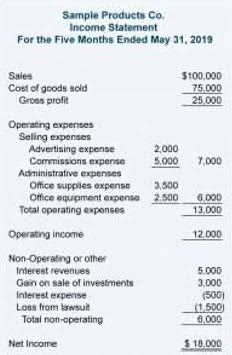
Whether using a Master Budget for comprehensive long-term planning or a Flexible Budget a flexible budget may be prepared for adaptability to changing conditions, effective budgeting practices are essential for the success of any organization. In theory, a flexible budget is not difficult to develop since the variable costs change with production and the fixed costs remain the same. However, planning to meet an organization’s goals can be very difficult if there are not many variable costs, if the cash inflows are relatively fixed, and if the fixed costs are high. For example, this article shows some large U.S. cities are faced with complicated budgets because of high fixed costs. For example, a small department store in a suburban strip mall sets a static operating budget for the third quarter, which includes the holiday season.
- This is typically upheld by businesses creating forecasts to predict business activity, and then setting budgets with maximum spend levels so not a single dollar goes through unchecked.
- The benefits of flexible budgeting extend to various stakeholders.
- While Flexible Budgets provide a dynamic and responsive approach to financial planning, they also come with challenges that require careful consideration.
- It is helpful in assessing the performance of departmental heads because their performance can be judged in relation to the level of activity attained by the organisation.
- A flexible budget answers that question given that expense levels are dynamic.
- A variance indicates how much actual performance deviated from the adjusted budget.
How to Choose the Right Budget for Your Business
In the twenty-first century, with rapid and drastic fluctuations in the economy and changes to industry and consumer behavior, companies must HOA Accounting be agile and able to account for a range of contingencies (Katz, 2016). Managerial expectations will be better adjusted once the period’s data is recalculated to include these impact-points. Once a flexible budget is constructed, its primary application lies in performance analysis, particularly through variance analysis.
- It begins with a static framework built from the costs that are not anticipated to change throughout the year.
- All of the different budget models have their benefits and drawbacks – even flexible budgets…as amazing as they sound.
- These budgets are then combined with data from the sales budget and the selling and administrative expense budget to determine the cash budget.
- It requires identifying the connection between sales revenue and each expense category and incorporating that information into a fully dynamic budget.
- In theory, a flexible budget is not difficult to develop since the variable costs change with production and the fixed costs remain the same.
- By comparison, a flexible budget necessarily invalidates the standing static budget.
Subject Terms
Separation of duties simply means that an individual should not have control over the transactions in the company. After inputting the value, press enter and the arrow facing a downward direction. Maintaining data integrity and ensuring consistent application of budgeting principles are also critical.

Key takeaways

A flexible budget, while much more time-intensive to create and maintain, offers an incredibly precise picture of your company’s performance. Due to the ability to make real-time adjustments, the results present great detail and accuracy at the end of the year. We have noticed that the recovery rate (Budgeted hrs/Total expenses) at the activity level of 70 % is $0.61 per hr.
Variable costs
By comparison, a flexible budget necessarily invalidates the standing static budget. The value of such a budget then becomes entirely archival—a performance measure that really has little long-term operational relevance. For a company, static budgets, prepared ahead of time and prepared without access to certain critical events (and numbers), can present a false or misleading financial profile for that company. Customer interest, for example, may prove broader than anticipated, or a gamble on an online store might create an unexpected spike in sales, resulting in higher than expected income.

Before constructing a flexible budget, it is important to understand the fundamental components that influence cost behavior. Costs CARES Act are generally categorized into fixed, variable, and mixed, each behaving differently in relation to activity levels. However, the accountant knows the broader picture and opts to prepare a flexible budget for the same holiday fiscal period.
- Capital Expenditure Budget and Research and Development Budget are examples of long-term budgets.
- The changes made in the flexible budget would then be compared to what actually occurs to result in more realistic and representative variance.
- It is based on fixed assumptions and provides a detailed roadmap for the organization’s financial activities.
- Therefore, businesses operating in dynamic environments or industries with significant fluctuations in activity may find a master budget less suitable.
- This total fixed cost amount forms a stable part of the flexible budget across all anticipated activity levels.
- Unlike static budgets, which remain constant regardless of performance, flexible budgets allow managers to compare actual results against adjusted expectations.
Suggestions for Further Reading on Budgeting in Accounting
The sales budget is based on the company’s sales forecast, which may require the use of sophisticated mathematical models and statistical tools. This budget does not take into consideration changes occurring from the external environment which are beyond the control of management. This budget is more useful for top-level management for formulating policies.
Semi-variable costs
- The receipts section lists all of the cash inflows, except for financing, expected during the budget period.
- Once these activity drivers are determined, costs must be classified as either fixed or variable.
- He started with the organization in an entry-level position, and then moved to a supervisory position and finally to a managerial role.
- Sometimes a budget may be prepared for a shorter period (like monthly budget, quarterly budget, etc.).
- Using a flexible budget helps you identify where you need to reduce spending to protect your bottom line.
- The Master Budget is ideal for comprehensive, long-term planning, while the Flexible Budget offers the adaptability needed for dynamic and unpredictable business environments.
- A flexible budget created each period allows for a comparison of apples to apples because it will calculate budgeted costs based on the actual sales activity.
In an organization, the term master budget refers to a summary of a company’s plans including specific targets for sales, production, and financing activities. This budget is defined as a budget which is prepared for period less than a year and is very useful to lower levels of management for control purposes. Such budgets are prepared for those activities, the trend in which is difficult to foresee over longer periods. Cash budget and material budget are examples of short-term budgets.
